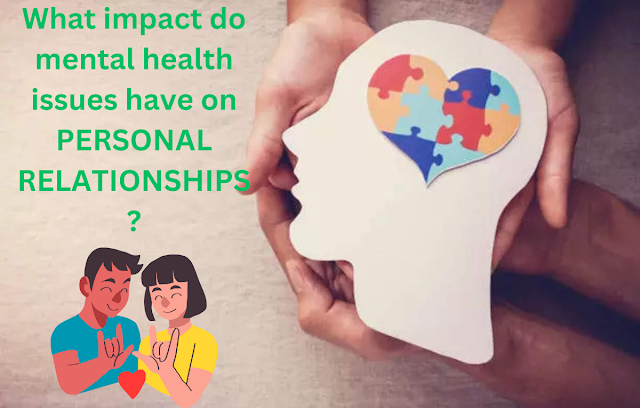What impact do mental health issues have on personal relationships?
What impact do mental health issues have on PERSONAL RELATIONSHIPS?
Mental health issues can significantly impact personal relationships in various ways, affecting communication, intimacy, trust, and overall relational dynamics. This essay explores the myriad ways in which mental health issues influence personal relationships, considering both the challenges and potential strategies for mitigating these effects.
Understanding Mental Health Issues
Mental health issues encompass a wide range of conditions, including depression, anxiety, bipolar disorder, schizophrenia, and post-traumatic stress disorder (PTSD), among others. These conditions can vary in severity and duration, influencing individuals differently based on personal, environmental, and genetic factors. Understanding the specific mental health issue at play is crucial for comprehending its impact on relationships.
1. Communication Breakdown
One of the primary ways mental health issues affect relationships is through communication breakdown. Effective communication is the bedrock of any healthy relationship, and mental health issues can severely disrupt this process.
• Depression: Individuals with depression often experience feelings of worthlessness, hopelessness, and low energy, which can lead to withdrawal from social interactions. They may struggle to express their needs or feelings, leading to misunderstandings and frustration for both parties.
• Anxiety: Anxiety can cause individuals to overthink and misinterpret interactions, leading to excessive worry about the relationship. This can result in either clinginess or avoidance, both of which strain communication.
• Bipolar Disorder: The mood swings associated with bipolar disorder can lead to unpredictable communication patterns. During manic phases, an individual might be overly talkative and impulsive, while during depressive phases, they may withdraw and become non-communicative.
2. Intimacy and Emotional Connection
Mental health issues can also impact the level of intimacy and emotional connection in a relationship.
• Depression and Anxiety: These conditions often lead to a reduced libido and a lack of interest in physical intimacy. This can create feelings of rejection and inadequacy in the partner, leading to emotional distance.
• PTSD: Trauma survivors may have difficulties with physical touch and intimacy due to triggers related to their traumatic experiences. This can make maintaining a close and intimate relationship challenging.
• Schizophrenia: Symptoms like delusions and hallucinations can create barriers to intimacy. The individual’s altered perception of reality can make it difficult for them to connect on an emotional and physical level.
3. Trust and Dependability
Trust is another critical component of healthy relationships that can be affected by mental health issues.
• Bipolar Disorder: During manic episodes, individuals may engage in risky behaviors such as overspending, substance abuse, or infidelity, which can erode trust in the relationship.
• Substance Abuse Disorders: Addiction often co-occurs with other mental health issues and can lead to deceit and unreliability, further breaking down trust between partners.
• Borderline Personality Disorder (BPD): Individuals with BPD may experience intense fears of abandonment, leading to clingy or controlling behaviors that can strain trust and reliability in the relationship.
4. Role Reversal and Caregiver Burden
In relationships where one partner has a mental health issue, there can often be a role reversal where the non-affected partner takes on a caregiver role.
• Caregiver Burnout: Constantly caring for a partner with mental health issues can lead to burnout. The caregiver may feel overwhelmed, leading to resentment and emotional exhaustion.
• Loss of Equality: The caregiver dynamic can create an imbalance in the relationship, where one partner feels they are always giving while the other is always receiving. This can erode the sense of partnership and equality.
5. Social Isolation
Mental health issues can lead to social isolation, which impacts not only the individual but also their partner.
• Withdrawal: Individuals with mental health issues may withdraw from social activities and relationships, leading to isolation. Their partners may also feel isolated as they may reduce their own social interactions to support their loved one.
• Stigma: The stigma surrounding mental health can lead to isolation as couples may avoid seeking support or discussing their struggles with friends and family, further exacerbating feelings of loneliness.
What impact do mental health issues have on PERSONAL RELATIONSHIPS?
6. Strategies for Mitigating the Impact
While the impact of mental health issues on relationships can be profound, there are several strategies that can help mitigate these effects and foster healthier relationships.
1.Open Communication
• Active Listening: Encouraging open dialogue where both partners feel heard and understood is crucial. This involves active listening, where each partner pays full attention and responds empathetically.
• Therapeutic Support: Engaging in couples therapy can provide a safe space for both partners to express their feelings and learn effective communication strategies.
2. Education and Understanding
• Psychoeducation: Learning about the specific mental health issue affecting the relationship can foster understanding and empathy. Knowing what to expect and recognizing symptoms can help partners respond more supportively.
• Support Groups: Joining support groups for individuals and couples dealing with similar issues can provide valuable insights and emotional support.
3. Boundaries and Self-Care
• Setting Boundaries: Establishing healthy boundaries is essential for both partners. This can involve setting limits on caregiving tasks or ensuring both partners have time for self-care.
• Self-Care: Both partners should prioritize self-care to maintain their own mental and emotional well-being. This includes activities that reduce stress and promote relaxation and happiness.
4. Professional Help
• Individual Therapy: Both partners may benefit from individual therapy to address their own mental health needs and learn coping strategies.
• Medication: For some mental health issues, medication can be an effective part of treatment. Consulting with a healthcare professional to manage medication can help stabilize symptoms and improve relationship dynamics.
5. Crisis Management
Crisis Plans: Developing a crisis plan can prepare both partners for acute episodes of mental health issues. This plan might include emergency contacts, strategies for de-escalation, and agreed-upon steps to take during a crisis.
Conclusion:-
Mental health issues can profoundly impact personal relationships, affecting communication, intimacy, trust, and overall dynamics. While these challenges are significant, they are not insurmountable. With open communication, education, boundaries, self-care, and professional support, couples can navigate these difficulties and maintain healthy, fulfilling relationships. Understanding and empathy are crucial, as they foster a supportive environment where both partners can thrive despite the challenges posed by mental health issues.
What impact do mental health issues have on PERSONAL RELATIONSHIPS?





Post a Comment